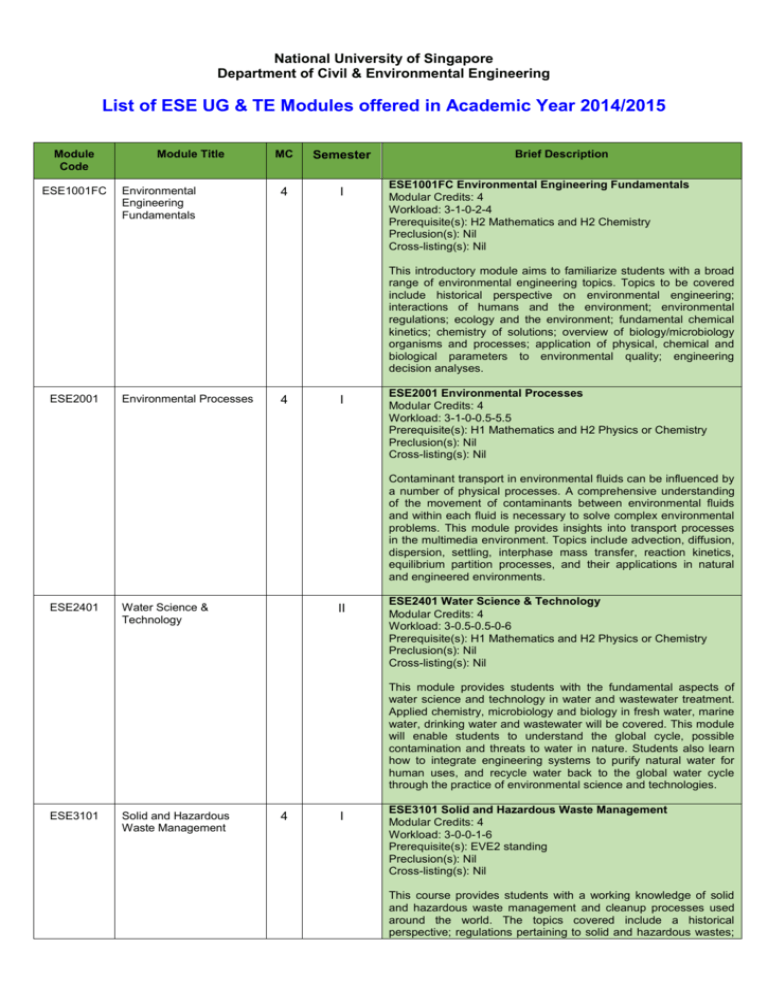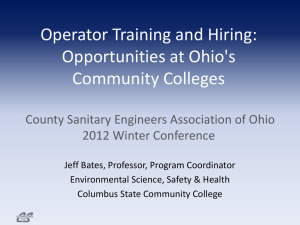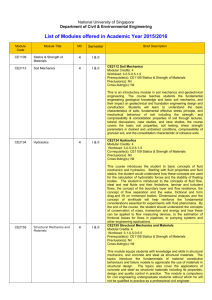List of ESE Modules offered in AY2014/2015
advertisement

National University of Singapore Department of Civil & Environmental Engineering List of ESE UG & TE Modules offered in Academic Year 2014/2015 Module Code ESE1001FC Module Title Environmental Engineering Fundamentals MC Semester 4 I Brief Description ESE1001FC Environmental Engineering Fundamentals Modular Credits: 4 Workload: 3-1-0-2-4 Prerequisite(s): H2 Mathematics and H2 Chemistry Preclusion(s): Nil Cross-listing(s): Nil This introductory module aims to familiarize students with a broad range of environmental engineering topics. Topics to be covered include historical perspective on environmental engineering; interactions of humans and the environment; environmental regulations; ecology and the environment; fundamental chemical kinetics; chemistry of solutions; overview of biology/microbiology organisms and processes; application of physical, chemical and biological parameters to environmental quality; engineering decision analyses. ESE2001 Environmental Processes 4 I ESE2001 Environmental Processes Modular Credits: 4 Workload: 3-1-0-0.5-5.5 Prerequisite(s): H1 Mathematics and H2 Physics or Chemistry Preclusion(s): Nil Cross-listing(s): Nil Contaminant transport in environmental fluids can be influenced by a number of physical processes. A comprehensive understanding of the movement of contaminants between environmental fluids and within each fluid is necessary to solve complex environmental problems. This module provides insights into transport processes in the multimedia environment. Topics include advection, diffusion, dispersion, settling, interphase mass transfer, reaction kinetics, equilibrium partition processes, and their applications in natural and engineered environments. ESE2401 Water Science & Technology II ESE2401 Water Science & Technology Modular Credits: 4 Workload: 3-0.5-0.5-0-6 Prerequisite(s): H1 Mathematics and H2 Physics or Chemistry Preclusion(s): Nil Cross-listing(s): Nil This module provides students with the fundamental aspects of water science and technology in water and wastewater treatment. Applied chemistry, microbiology and biology in fresh water, marine water, drinking water and wastewater will be covered. This module will enable students to understand the global cycle, possible contamination and threats to water in nature. Students also learn how to integrate engineering systems to purify natural water for human uses, and recycle water back to the global water cycle through the practice of environmental science and technologies. ESE3101 Solid and Hazardous Waste Management 4 I ESE3101 Solid and Hazardous Waste Management Modular Credits: 4 Workload: 3-0-0-1-6 Prerequisite(s): EVE2 standing Preclusion(s): Nil Cross-listing(s): Nil This course provides students with a working knowledge of solid and hazardous waste management and cleanup processes used around the world. The topics covered include a historical perspective; regulations pertaining to solid and hazardous wastes; Module Code Module Title MC Semester Brief Description waste characterisation and risk assessment; waste handling, collection and transport; waste treatment and disposal methods, including biological and chemical treatment, incineration, pyrolysis, landfill, and site remediation. Waste minimisation and cost analysis are also discussed. The course is targeted at level 3 environmental engineering students. ESE3201 Air Quality Management 4 I ESE3201 Air Quality Management Modular Credits: 4 Workload: 3-1-0.5-0.5-5 Prerequisite(s): EVE2 standing Preclusion(s): Nil Cross-listing(s): Nil This module equips students with fundamental knowledge in atmospheric air quality, covering regional and global issues. It provides basic knowledge and training in formulating and evaluating air pollution problems, predicting the effects of airborne pollutants, and offers engineering solutions. The topics covered include effects of emission sources and pollutants, importance and application of air pollution models, as well as air pollution control strategies and devices. The composition and impact of atmospheric system, chemical reactions of stratospheric ozone, and global climate forcing are also included. ESE3301 Environmental Microbiological Principles 4 I ESE3301 Environmental Microbiological Principles Modular Credits: 4 Workload: 3-1-1-0-5 Prerequisite(s): EVE2 standing or equivalent Preclusion(s): Nil Cross-listing(s): Nil The module provides students with a strong foundation in environmental microbiology and its application to pollution control systems. It provides an introduction to the principles of microbiology in environmental engineering. After an overview of microbial classification and the applications of environmental microbiology, the course addresses aspects of microbial ecology and population dynamics. Microbial characteristics of the terrestrial and aquatic environment are covered, as well as aspects of indoor air pollution control. Microbial biogeochemical cycling of elements is examined with respect to nitrogen, carbon and sulphur. Aspects of genetic engineering in environmental microbiology are introduced with regard to applied biotechnologies. ESE3401 Water & Wastewater Engineering 1 4 I ESE3401 Water & Wastewater Engineering 1 Modular Credits: 4 Workload: 3-0-0.5-0.5-6 Prerequisite(s): ESE2401 Preclusion(s): Nil Cross-listing(s): Nil This module introduces students to the unit operations and processes application for domestic water supply and wastewater treatment. Integration of physical, chemical and biological processes is the basis of current water and wastewater design practice. This module will enable students to understand the main treatment processes and engineering concerns of water and wastewater treatment systems. Students learn to identify the appropriate treatment system to address water and wastewater treatment needs and design basic processes of water and wastewater treatment systems. ESE4401 Water & Wastewater Engineering 2 4 II Water & Wastewater Engineering 2 Modular Credits: 4 Workload: 3-0.5-0-0.5-6 Prerequisite(s): Preclusion(s): Nil Cross-listing(s): Nil Module Code Module Title MC Semester Brief Description This module provides the information regarding application of advanced unit operations and processes for enhancing the quality of treated effluent and rendering the product water suitable for reuse applications. The module will enable students to understand the fundamental principles of advanced wastewater treatment. Students are taught to identify and design the appropriate advanced treatment system to enhance the quality of the treated effluent and exploit the option of reuse application. ESE4404 Bioenergy 4 I Bioenergy Modular Credits: 4 Workload: 3-1-0-0-3-3 Prerequisite(s): Year 3 standing or equivalent with background in fluid mechanics Preclusion(s): Nil Cross-listing(s): Nil Sustainability is the key to economic growth in the twenty-first century. With increasing global demand for energy, growing energy insecurity, and adverse impact of fossil fuel consumption on climate change, it is necessary to focus efforts toward bioenergy production from renewable, low-cost and locally available feedstock such as biomass and biowastes. This course introduces the various theories and technologies for production of bioenergy from various feedstocks. Topics include anaerobic technology for production of methane, bioethanol, methanol, hydrogen and biodiesel from biowastes and biomass, and microbial fuel cell for direct electricity production. Other processes such as pyrolysis of biomass shall also be introduced. Students will gain a comprehensive knowledge on the various options and challenges facing the production of bioenergy. ESE4407 Environmental Forensics 4 II ESE4407 Environmental Forensics Modular Credits: 4 Workload: 3-1-0-3-3 Prerequisite(s): ESE3101, ESE3201 and ESE3401 Preclusion(s): Nil Cross-listing(s): Nil This module examines the theory and practical application of environmental chemistry and biology for the purpose of identifying contamination sources and forecasting environmental fate and exposure in organisms. The module provides an overview of the emerging field of environmental forensics, which is gaining prominence within government agencies, industry and environmental consulting firms. An interdisciplinary approach is used, introducing the students to fundamental concepts and methodologies from a variety of scientific sub-disciplines including analytical chemistry, molecular biology, ecology, simulation modelling and ecological risk assessment, as well as an awareness of legal and regulatory frameworks related to environmental protection and toxic substance management. The students will learn essential skills to understand technical and legal aspects of complex environmental contamination problems. ESE4408 Environmental Impact Assessment 4 II Environmental Impact Assessment Modular Credits: 4 Workload: 3-0-0-1-6 Prerequisite(s): ESE3101, ESE3201, ESE3301 and ESE3401 Preclusion(s): Nil Cross-listing(s): Nil Environmental Impact Assessment (EIA) is the process of identifying, predicting, evaluating and mitigating the biophysical, social, and other relevant effects of development proposals prior to major decisions being taken and commitments made. The objective of EIA is to ensure that decision-makers consider environmental impacts before deciding whether to proceed with new projects. Participants are introduced to the concept of EIA, its historical evolution and the terminologies that are used worldwide. Module Code Module Title MC Semester Brief Description Lectures will cover the organizational aspects of EIA, the EIA framework and the procedural methods to conduct an EIA, with special emphasis on water and water related issues. Participants will carry out a mini EIA study using the various approaches covered in the module. ESE4501 Design Project 4 I ESE4501 Design Project Modular Credits: 4 Workload: 1-0-0-4-5 Prerequisite(s): EVE4 standing Preclusion(s): Nil Cross-listing(s): Nil The students are assigned a design project involving various environmental considerations. The module provides the opportunity for students to work as a team on an environmental project integrating knowledge they have gained from modules they have taken in earlier years. The module will also enhance their interpersonal, communication and leadership skills through group projects, report writing and a few oral presentations. ESE4502 B.ENG. DISSERTATION 12 I & II ESE4502 B.Eng. Dissertation Modular Credits: 12 Workload: 0-0-18-0-12 Prerequisite(s): EVE4 standing Preclusion(s): Nil Cross-listing(s): Nil Each student is assigned a research project in environmental science and engineering. This module provides the opportunity for students to outsource for relevant information, design the experiments, analyse critically the data obtained and sharpen their communication skills through report writings and oral presentations. ESE5202 Air Pollution Control Technology 4 II ESE5202 AIR POLLUTION CONTROL TECHNOLOGY Modular Credits: 4 Workload: 3-0-0-1-6 Prerequisite(s): Nil Preclusion(s): Nil Cross-listing(s): Nil This module covers several topics in air pollution control including the nature and sources of air pollutants in the indoor and outdoor environments, air pollution models, regulations, technical methods and measures to remove/suppress the emissions of air pollutants. The physical, chemical, and physico-chemical characteristics of pollutants in the atmosphere are described. The principal industrial sources of atmospheric pollution and the technological conditions for the formation of solid and gaseous substances in emissions are defined. Technical principles, basic processes, and equipment employed to limit and eliminate particulates, volatile organic compounds, sulfur oxides, and nitrogen oxides are discussed in detail. ESE5203 Aerosol Science and Technology 4 II ESE5203 AEROSOL SCIENCE AND TECHNOLOGY Modular Credits: 4 Workload: 3-0-0-1-6 Prerequisite(s): Nil Preclusion(s): Nil Cross-listing(s): Nil Aerosol science deals with the behaviour of very fine particles in fluid media which finds many areas such as biosolid management, air pollution control, ultra-cleaning manufacturing technology, and advanced materials. In this module, the basic principles of aerosol science and the corresponding industrial applications will be Module Code Module Title MC Brief Description Semester covered. Topics include physics of aerosols, size distributions, mechanics and transport of particles, aerosol dynamics, nanoparticle synthesis, combustion aerosols, and pharmaceutical aerosols. ESE5301 Environmental Biological Principles 4 I ESE5301 Environmental Biological Principles Modular Credits: 4 Workload: 3-0-0-1-6 Prerequisite(s): EVE4 standing Preclusion(s): Nil Cross-listing(s): Nil This module provides students with a strong foundation in biological principles for environmental engineering, with primary focus on natural biological processes. After an overview of biological principles and classification, the module reviews metabolic adaptations to various natural environments, including extreme habitats. Aspects of genetic adaptation and tolerance to environmental contamination are covered, together with the manipulation of biological processes to degrade and stabilise contaminants. Emphasis is placed on biodegradation of organic pollutants and their bioremediation. Aspects of organic waste stabilisation and remediation of inorganic wastes are included. Lastly, the use of macrophytes contaminated soils is examined. ESE5402 Industrial Wastewater Control 4 I for phytoremediation of ESE5402 Industrial Wastewater Control Modular Credits: 4 Workload: 3-0-0-1-6 Prerequisite(s): EVE4 standing Preclusion(s): Nil Cross-listing(s): Nil This module introduces students to the theories and processes commonly used in industrial wastewater control. Topics covered in this course include characteristics of industrial wastewater, control theories and methods, and treatment of specific industrial wastewaters. The module will enable students to understand the particular problems associated with industrial wastewater control. The students will also gain the knowledge that is required for the design of treatment processes to effectively solve environmental problems relating to industrial wastewater discharge. ESE5406 Membrane Treatment Process Modelling 4 II ESE5406 Membrane Treatment Process Modelling Modular Credits: 4 Workload: 3-0-0-1-6 Prerequisite(s): EVE4 standing or higher Preclusion(s): Nil Cross-listing(s): Nil Membrane technology is an emerging field in water and wastewater engineering. This module offers students the fundamental principles and practical applications of membrane processes as an advanced measure for water and wastewater treatment. The topics covered in this module are membrane transport, concentration polarisation, and membrane fouling in relation to Module Code Module Title MC Brief Description Semester water and wastewater engineering. The module will also deal with fouling characterisation of feed water, membrane fouling modelling and methods for fouling prevention and mitigation. Applications of MF, UF, and RO membranes in various water and wastewater. ESE5602 Environmental Management Systems 4 II Not offered ESE5602 Environmental Management Systems Modular Credits: 4 Workload: 3-0-0-1-6 Prerequisite(s): EVE4 standing Preclusion(s): Nil Cross-listing(s): Nil This module covers historical perspective of environmental management and the basics of environmental management systems (EMS), including an introduction to environmental management, EMS models and key elements, environmental review, environmental policy, identifying and evaluating environmental aspects and impacts, legal requirements, objectives, targets and management programmes, implementation of EMS requirements, monitoring and measurement, EMS audits, management review and continual improvement. Practical sessions will be included, covering, identifying, and evaluating environmental aspects and impacts. ESE5608 Heavy Metals in the Environment 4 II I ESE5608 Heavy Metals in the Environment Modular Credits: 4 Workload: 3-0-0-1-6 Pre-requisite: Nil Toxic metal ions have posted a great challenge to environmental engineers and scientists as they cause many serious pollution problems in water, soil and air. The module begins with an overview of historical and industrialized water pollution issues. The metal ion chemistry will be taught. A series of mathematical models aiming at description of metal ion distribution in various natural systems will be presented. Students will learn important treatment technologies such as precipitation, ion exchange and adsorption. Finally, case studies will be presented. This module is targeted at level 4 environmental engineering students and post-graduate students. It is expected that the students after learning this module will be able to design treatment systems for metal waste screams as well as understand toxic metal transportation in natural surface or subsurface systems. Information is correct as @ 3 Dec 2014. CEE reserves the right to update in short notice.







